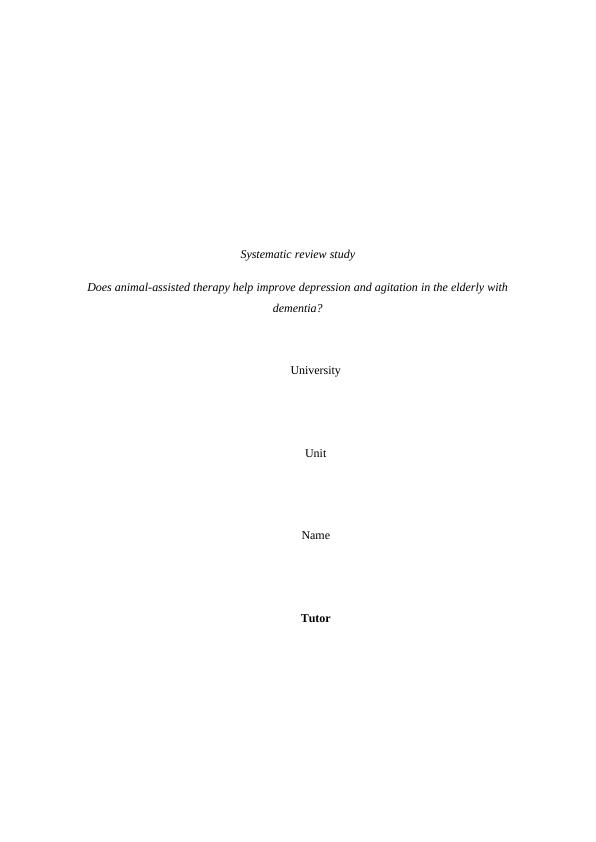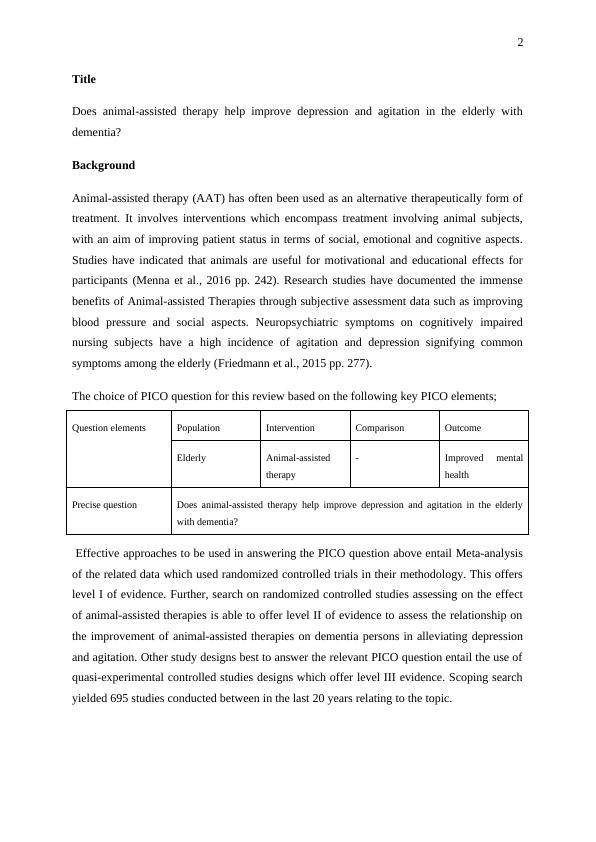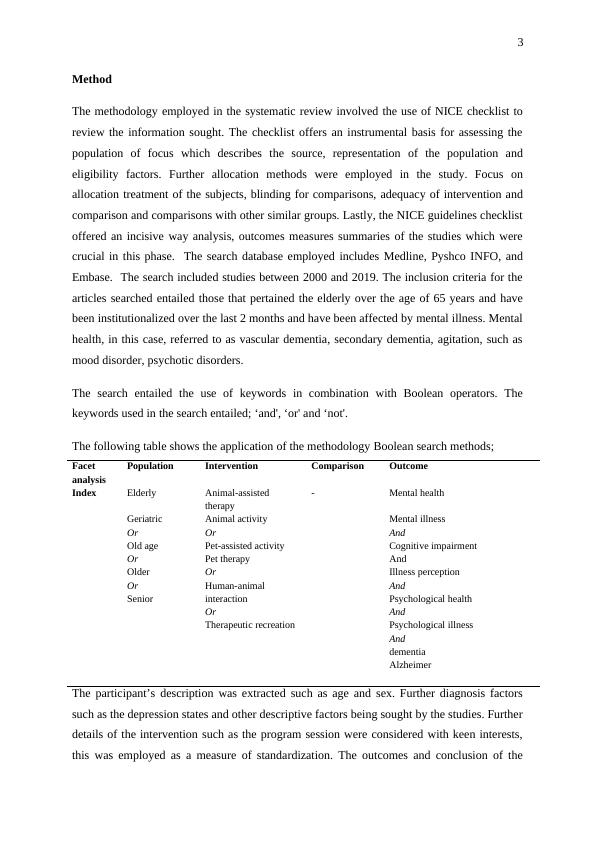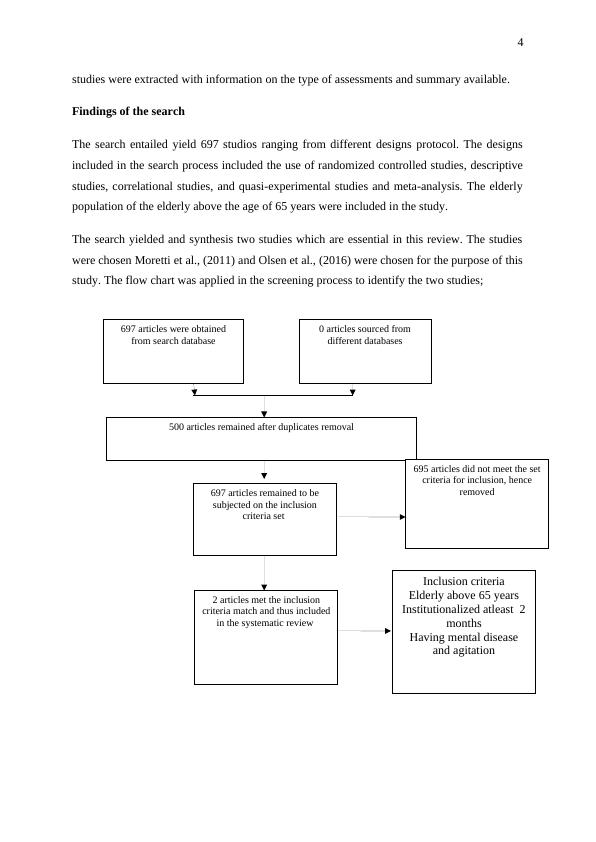Does animal-assisted therapy help improve depression and agitation in the elderly with dementia?
Added on 2023-04-08
11 Pages2453 Words193 Views
Systematic review study
Does animal-assisted therapy help improve depression and agitation in the elderly with
dementia?
University
Unit
Name
Tutor
Does animal-assisted therapy help improve depression and agitation in the elderly with
dementia?
University
Unit
Name
Tutor

2
Title
Does animal-assisted therapy help improve depression and agitation in the elderly with
dementia?
Background
Animal-assisted therapy (AAT) has often been used as an alternative therapeutically form of
treatment. It involves interventions which encompass treatment involving animal subjects,
with an aim of improving patient status in terms of social, emotional and cognitive aspects.
Studies have indicated that animals are useful for motivational and educational effects for
participants (Menna et al., 2016 pp. 242). Research studies have documented the immense
benefits of Animal-assisted Therapies through subjective assessment data such as improving
blood pressure and social aspects. Neuropsychiatric symptoms on cognitively impaired
nursing subjects have a high incidence of agitation and depression signifying common
symptoms among the elderly (Friedmann et al., 2015 pp. 277).
The choice of PICO question for this review based on the following key PICO elements;
Question elements Population Intervention Comparison Outcome
Elderly Animal-assisted
therapy
- Improved mental
health
Precise question Does animal-assisted therapy help improve depression and agitation in the elderly
with dementia?
Effective approaches to be used in answering the PICO question above entail Meta-analysis
of the related data which used randomized controlled trials in their methodology. This offers
level I of evidence. Further, search on randomized controlled studies assessing on the effect
of animal-assisted therapies is able to offer level II of evidence to assess the relationship on
the improvement of animal-assisted therapies on dementia persons in alleviating depression
and agitation. Other study designs best to answer the relevant PICO question entail the use of
quasi-experimental controlled studies designs which offer level III evidence. Scoping search
yielded 695 studies conducted between in the last 20 years relating to the topic.
Title
Does animal-assisted therapy help improve depression and agitation in the elderly with
dementia?
Background
Animal-assisted therapy (AAT) has often been used as an alternative therapeutically form of
treatment. It involves interventions which encompass treatment involving animal subjects,
with an aim of improving patient status in terms of social, emotional and cognitive aspects.
Studies have indicated that animals are useful for motivational and educational effects for
participants (Menna et al., 2016 pp. 242). Research studies have documented the immense
benefits of Animal-assisted Therapies through subjective assessment data such as improving
blood pressure and social aspects. Neuropsychiatric symptoms on cognitively impaired
nursing subjects have a high incidence of agitation and depression signifying common
symptoms among the elderly (Friedmann et al., 2015 pp. 277).
The choice of PICO question for this review based on the following key PICO elements;
Question elements Population Intervention Comparison Outcome
Elderly Animal-assisted
therapy
- Improved mental
health
Precise question Does animal-assisted therapy help improve depression and agitation in the elderly
with dementia?
Effective approaches to be used in answering the PICO question above entail Meta-analysis
of the related data which used randomized controlled trials in their methodology. This offers
level I of evidence. Further, search on randomized controlled studies assessing on the effect
of animal-assisted therapies is able to offer level II of evidence to assess the relationship on
the improvement of animal-assisted therapies on dementia persons in alleviating depression
and agitation. Other study designs best to answer the relevant PICO question entail the use of
quasi-experimental controlled studies designs which offer level III evidence. Scoping search
yielded 695 studies conducted between in the last 20 years relating to the topic.

3
Method
The methodology employed in the systematic review involved the use of NICE checklist to
review the information sought. The checklist offers an instrumental basis for assessing the
population of focus which describes the source, representation of the population and
eligibility factors. Further allocation methods were employed in the study. Focus on
allocation treatment of the subjects, blinding for comparisons, adequacy of intervention and
comparison and comparisons with other similar groups. Lastly, the NICE guidelines checklist
offered an incisive way analysis, outcomes measures summaries of the studies which were
crucial in this phase. The search database employed includes Medline, Pyshco INFO, and
Embase. The search included studies between 2000 and 2019. The inclusion criteria for the
articles searched entailed those that pertained the elderly over the age of 65 years and have
been institutionalized over the last 2 months and have been affected by mental illness. Mental
health, in this case, referred to as vascular dementia, secondary dementia, agitation, such as
mood disorder, psychotic disorders.
The search entailed the use of keywords in combination with Boolean operators. The
keywords used in the search entailed; ‘and', ‘or' and ‘not'.
The following table shows the application of the methodology Boolean search methods;
Facet
analysis
Population Intervention Comparison Outcome
Index Elderly Animal-assisted
therapy
- Mental health
Geriatric
Or
Old age
Or
Older
Or
Senior
Animal activity
Or
Pet-assisted activity
Pet therapy
Or
Human-animal
interaction
Or
Therapeutic recreation
Mental illness
And
Cognitive impairment
And
Illness perception
And
Psychological health
And
Psychological illness
And
dementia
Alzheimer
The participant’s description was extracted such as age and sex. Further diagnosis factors
such as the depression states and other descriptive factors being sought by the studies. Further
details of the intervention such as the program session were considered with keen interests,
this was employed as a measure of standardization. The outcomes and conclusion of the
Method
The methodology employed in the systematic review involved the use of NICE checklist to
review the information sought. The checklist offers an instrumental basis for assessing the
population of focus which describes the source, representation of the population and
eligibility factors. Further allocation methods were employed in the study. Focus on
allocation treatment of the subjects, blinding for comparisons, adequacy of intervention and
comparison and comparisons with other similar groups. Lastly, the NICE guidelines checklist
offered an incisive way analysis, outcomes measures summaries of the studies which were
crucial in this phase. The search database employed includes Medline, Pyshco INFO, and
Embase. The search included studies between 2000 and 2019. The inclusion criteria for the
articles searched entailed those that pertained the elderly over the age of 65 years and have
been institutionalized over the last 2 months and have been affected by mental illness. Mental
health, in this case, referred to as vascular dementia, secondary dementia, agitation, such as
mood disorder, psychotic disorders.
The search entailed the use of keywords in combination with Boolean operators. The
keywords used in the search entailed; ‘and', ‘or' and ‘not'.
The following table shows the application of the methodology Boolean search methods;
Facet
analysis
Population Intervention Comparison Outcome
Index Elderly Animal-assisted
therapy
- Mental health
Geriatric
Or
Old age
Or
Older
Or
Senior
Animal activity
Or
Pet-assisted activity
Pet therapy
Or
Human-animal
interaction
Or
Therapeutic recreation
Mental illness
And
Cognitive impairment
And
Illness perception
And
Psychological health
And
Psychological illness
And
dementia
Alzheimer
The participant’s description was extracted such as age and sex. Further diagnosis factors
such as the depression states and other descriptive factors being sought by the studies. Further
details of the intervention such as the program session were considered with keen interests,
this was employed as a measure of standardization. The outcomes and conclusion of the

697 articles were obtained
from search database
0 articles sourced from
different databases
500 articles remained after duplicates removal
2 articles met the inclusion
criteria match and thus included
in the systematic review
697 articles remained to be
subjected on the inclusion
criteria set
695 articles did not meet the set
criteria for inclusion, hence
removed
Inclusion criteria
Elderly above 65 years
Institutionalized atleast 2
months
Having mental disease
and agitation
4
studies were extracted with information on the type of assessments and summary available.
Findings of the search
The search entailed yield 697 studios ranging from different designs protocol. The designs
included in the search process included the use of randomized controlled studies, descriptive
studies, correlational studies, and quasi-experimental studies and meta-analysis. The elderly
population of the elderly above the age of 65 years were included in the study.
The search yielded and synthesis two studies which are essential in this review. The studies
were chosen Moretti et al., (2011) and Olsen et al., (2016) were chosen for the purpose of this
study. The flow chart was applied in the screening process to identify the two studies;
from search database
0 articles sourced from
different databases
500 articles remained after duplicates removal
2 articles met the inclusion
criteria match and thus included
in the systematic review
697 articles remained to be
subjected on the inclusion
criteria set
695 articles did not meet the set
criteria for inclusion, hence
removed
Inclusion criteria
Elderly above 65 years
Institutionalized atleast 2
months
Having mental disease
and agitation
4
studies were extracted with information on the type of assessments and summary available.
Findings of the search
The search entailed yield 697 studios ranging from different designs protocol. The designs
included in the search process included the use of randomized controlled studies, descriptive
studies, correlational studies, and quasi-experimental studies and meta-analysis. The elderly
population of the elderly above the age of 65 years were included in the study.
The search yielded and synthesis two studies which are essential in this review. The studies
were chosen Moretti et al., (2011) and Olsen et al., (2016) were chosen for the purpose of this
study. The flow chart was applied in the screening process to identify the two studies;

End of preview
Want to access all the pages? Upload your documents or become a member.
Related Documents
Comparing Robotic Pet Therapy and Pet Therapy for Dementia Patientslg...
|7
|1512
|123
PICO Question and Search Strategylg...
|5
|838
|359
The Benefit of Pets and Animal-Assisted Therapy to the Health of Older Individuals PDFlg...
|13
|4288
|247
Effectiveness of Cognitive Behavioral Therapy and Exercise Therapy without Antidepressants for Depression Condition: A Literature Reviewlg...
|10
|2282
|358
Clinical Governance and Practice Improvementlg...
|11
|2388
|66
Effectiveness of Pain Management in Elderly Cancer Patients: A PICO Analysislg...
|12
|2995
|166
